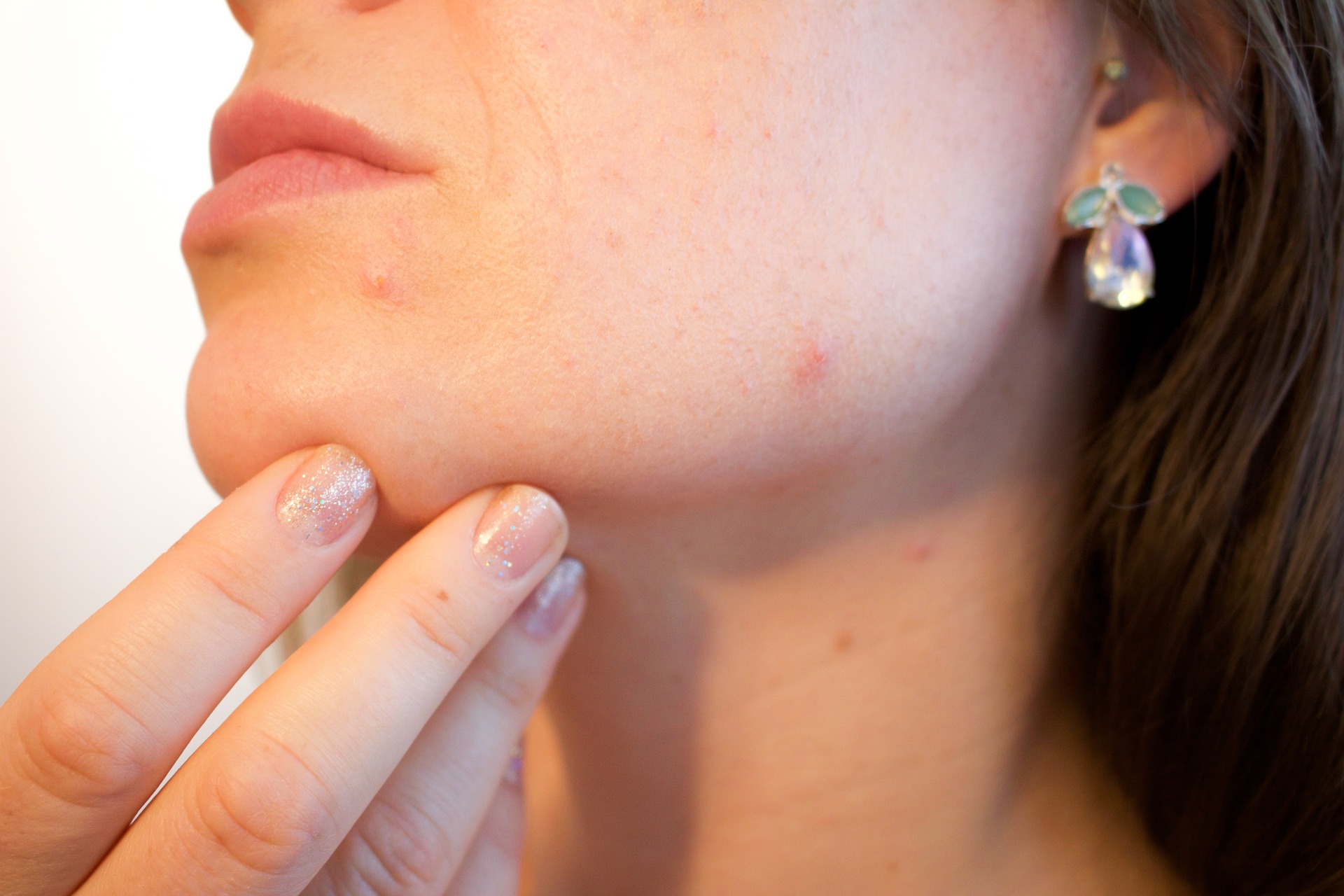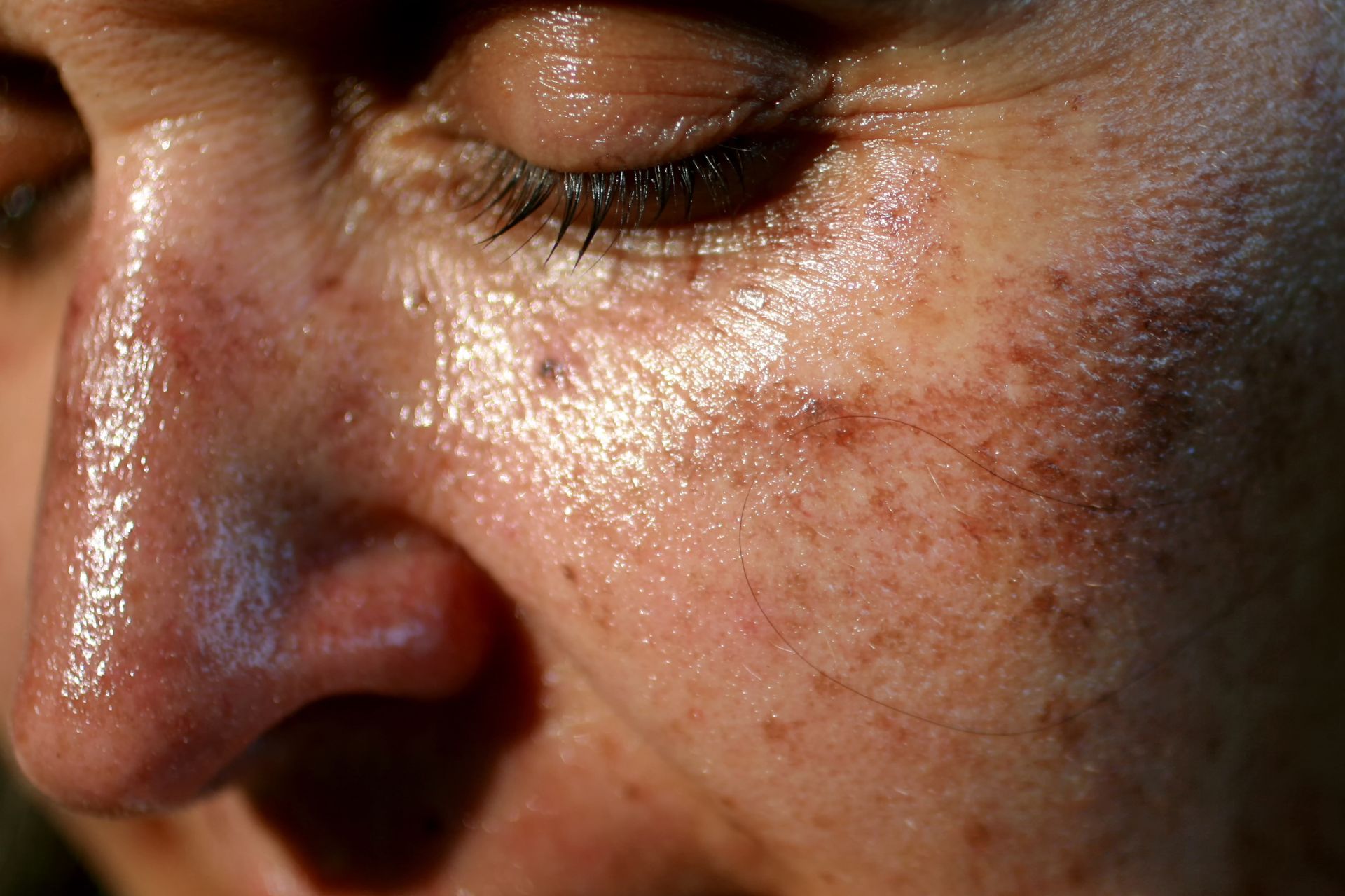

HOW MENOPAUSE AFFECTS THE SKIN


As women, we go through many cycles in our lifetime that leave our hormones in a state of flux. Hormonal fluctuations happen through puberty, pregnancy, perimenopause, and menopause. Every woman - except for those who’ve had their ovaries removed before puberty - will go through menopause. Many women can start experiencing the first symptoms of menopause in their mid-30s to mid-40s, but it can take another 15-20 years before full menopause. Many observe changes to their mood, sleep, sex drive, and weight as menstrual cycles change before coming to a halt completely. There are 30+ symptoms related to menopause and changes to your skin are a big part of the hormonal ups and downs. How menopause affects the skin is a hot topic because when we look in the mirror, it’s often the most visible factor of aging and the beginning of menopause. In this blog, I’m going to focus on five menopausal skin concerns. You can also download my Menopause 5 Skincare Guide to get a full 25 page colour detailed guide on how to manage your skin during menopause.

What is Menopause?
First, let’s address what menopause and peri-menopause are so we can understand these stages better and whether we’re currently in them. I find that there’s some confusion around these words as the topic of menopause seems to still be a bit taboo. Yes, even in 2023 not many people talk about it or its effects. Menopause marks the end of our menstrual cycles and our ability to bear children. Officially, it starts 12 months after our last period. The stage of life leading up to menopause is called perimenopause and I'm currently in it. The age of the end of our menstrual cycle can vary just like the beginning of our periods in puberty. I was 13, for example. My best friend was 11. Recently, I needed to have a conversation with my mother (so I know what to prepare myself for) and she said that she was 55 when her period ended. I suspected I had about 10 more years of my recently irregular periods. Menopause is a natural part of aging, but it can definitely feel anything but natural especially when there are so many symptoms to keep track of. My long irregular periods that go on for a month at a time can be hidden, but how menopause affects the skin is very much real every time I look in the mirror.
What does Menopause do to your skin?
Changes in the texture and appearance of your skin during this stage are a result of a drop in the secretion of the female sex hormone, estrogen. Estrogen has a direct link to our skin health. It enhances collagen production, it boosts sebum formation, it balances the moisture levels of the skin, and strengthens the skin barrier. In Menopause, hormone levels fluctuate and along with estrogen levels dropping, progesterone and testosterone levels can rise. Progesterone stimulates the production of sebum or the oil glands in the skin. It can cause the skin to swell, and compress the look of pores. Too much of it, however, can lead to oil build up. Testosterone works similarly to progesterone by activating the sebaceous glands to produce oil, and can usually present itself around your period. Our hormones have everything to do with how our skin looks and feels. From breakouts as the result of rising progesterone and testosterone to plunging estrogen levels that can lead to loss of firming and dryness. Let’s have a closer look the five changes and how menopause affects the skin.

1) Collagen loss
As menses begin to cease, you may notice that your skin is no longer as firm, bouncy, and youthful as it used to be in your 20s. You may observe sagginess around your face and neck. The loss of skin elasticity is due to collagen loss. Research states that women lose about 30% of the collagen in their skin during the first 5 years of menopause. Collagen is a protein and one of the main building blocks for our bones, skin, hair, muscles, tendons, and ligaments. Our bodies naturally make collagen, but production starts to decline in our mid to late 20s.
The loss of collagen can be enhanced by lifestyle and environmental factors so it can vary from person to person. The breakdown of collagen will be more rapid if you’re a smoker, consume a high sugar diet, spend a lot of time in the sun and other life stressors.
How to care of your sagging skin:
- Invest in high-quality skincare products that support and boost the production of collagen like Retinol, Vitamin C and Glycolic Acid
- Protect your skin by wearing SPF daily as free radicals from sun exposure can affect natural collagen levels
- Cut back on sugars, quit smoking
- Check out my video on collagen loss
My recommendation when it comes to skincare products is the Collagen Bundle , a curated range of products containing collagen-enhancing ingredients. This bundle is exceptional for boosting skin firmness, improving the appearance of fine lines and wrinkles, and protecting the skin.
2) Increased sensitivity
Did your skin suddenly become hypersensitive after you hit menopause? If yes, your fluctuating hormones which change your skin pH are responsible. As estrogen dips, you may notice that your skin gets irritated easily. It is also common for you to develop sensitivity to certain fabrics, detergents, or skincare products even if you’ve been using them for years. To regulate skin sensitivity, opt for soothing products that calm irritations.
How to care of your sensitive skin:
- Simplify your skincare products; less is more
- Go fragrance, perfume free
- Limit aggressive techniques like physical exfoliation
- Heal your skin barrier with plant oils
I love the Skin Soother bundle because it brings together the most gentle products from our collections - an array of gentle products that hydrate, moisturize, and nourish the skin.

3) Hormonal acne
The beginning and end of a woman's menstrual years have one thing in common - acne. This is another common side effect of how menopause affects the skin. Menopausal acne occurs as a result of a decline in estrogen and an increase in androgens like testosterone. High androgen secretions are characterized by increased oil production, which may clog your pores and trigger acne. There are many pharmaceutical solutions for acne, but I want to give you gentle solutions that will help calm breakouts, but also benefit your aging skin. Acne, pimples, blackheads, and whatever form of breakouts that you may be battling with, can be effectively managed with the right skincare regimen. Acne prone skin is sensitive skin so be gentle and kind to both your skin and yourself. Allow it to heal. You might also find this blog I wrote about acne-prone skin helpful.
How to care of your broken out skin:
- Invest in a Retinol product to help clear and treat break outs and acne; retinol exfoliates to remove dirt, dead skin cells, and oil from pores
- Use tea tree essential oil to reduce inflammation which can contribute to acne
- Treat your skin with an AHA (Alpha Hydroxy Acid) like Glycolic Acid or BHA (Beta Hydroxy Acid) like Salicylic Acid
- Avoid harsh treatments like physical scrubs and heavily scented products
For skin clarity, add the Clear Skin Bundle to your anti-acne arsenal. This bundle comprises products that are professionally formulated with acne-fighting ingredients while remaining gentle to your skin.
4) Increased dryness
Estrogen plays a crucial role in the production of oil in the body. A drop in estrogen levels results in reduction in the secretion of oil glands in the body.
This is why you may notice signs of increased dryness and itchiness on your skin. The drop in estrogen also affects the lipid barrier of the skin. This means that your skin might not be able to hold in the moisture that you’re giving it. This is why it’s important that you apply the right products in the right order.
Dehydrated skin is skin that lacks water. This can change with our indoor and outdoor environment, for example, in winter and with indoor heating. When the season change, you will feel it the most. Dry skin lacks oil and not water. With age and hormonal changes, our skin produces less oil, and so we need to give our skin that which is not producing. In this case more oil.
How to care for dry skin:
- Invest in skincare products that consist of both water and oil
- Layer products to help lock in moisture
- Cleanse gently ONCE a day
Control dryness, dehydration, and other dry-skin related issues with any of these super hydrating bundles:
Graydon Skin Hydration Bundle and the Cocoon Apothecary Skin Hydration Bundle

5) Dull, damaged skin/Hyperpigmentation
Menopause affects your skin in the above ways, but it can also take a toll on your body and even dull your shine. One reason is that an imbalance in estrogen levels causes pigmentation issues such as melasma, uneven skin tone, dull skin, and sunspots. The second reason is that you have spent the last 20 years of your life worshipping the sun, so there bound to be some signs of damage which can include brown spots, wrinkles, broken capillaries, and uneven skin texture.
How to care for your dull, damaged skin:
- Invest in an SPF for your face and use it religiously; check out this SPF guide for more tips!
- Use Vitamin C daily under your SPF to brighten the skin and lighten hyperpigmentation
- Try a serum with frankincense oil and focus on dark spots – this is one of my favourite skincare essential oils!
- Add Glycolic Acid to your skincare regimen (and stay consistent!) to smooth skin texture and lighten dark spots
- Check out my video on how to brighten your skin
To maintain the radiance and health of your skin, it’s important that you use sunscreen daily. Invest in a broad spectrum sunscreen with SPF 30 or more. A product worth a try is the Ava Isa Sun-To-Serum Drops SPF 35. This product is light and fast-absorbing like a serum. For a healthy glow during menopause, choose the Bright Skin bundle.
Final Thoughts:
Although, the beauty industry has capitalized on the fear of aging to churn out products that preserve youth and erase signs of aging, it’s necessary to know that growing older should not be stigmatized. There should be no age limit on how to care for your health, beauty, sexual life, and vitality. If you always take proper care of yourself, you'll age gracefully. I wanted to offer you some insight on how menopause affects the skin and little steps you can take to look and feel better in your skin. If you have any questions or would like to book a consultation with me, please reach out to me directly at maria@greenbeautyexpert.ca or pop your comments below. You can also download my Menopause 5 Skincare Guide to get a full 25 page colour detailed guide on how to manage your skin during menopause.
Disclaimer – I’m not a dermatologist. I am 46 years old and have just entered perimenopause. I'm currently learning more on how to navigate both my skin and overall health. The above advice has been put together for you based on my own research, personal experience and work in the beauty industry in the past 20 years.

0 comments